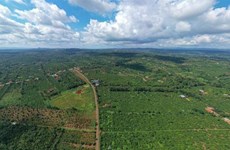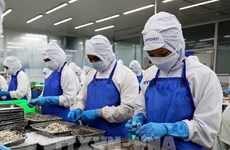Genetically modified maize successfully tested
The experimental growing of genetically modified (GM) maize in the
Central Highlands province of Dak Lak has showed good results with
higher yield, quality and anti-pest capacity than normal maize grown in
the same conditions.
The experimental growing of genetically modified (GM) maize in the
Central Highlands province of Dak Lak has showed good results with
higher yield, quality and anti-pest capacity than normal maize grown in
the same conditions.
The information was released at a seminar aimed at improving public awareness of GM maize jointly held by the Ministry of Agriculture and Rural Development, the Central Highlands Agro-Forestry Science & Technology Institute (CASTI) and the Dekalb Vietnam Co., Ltd in Buon Ma Thuot City on August 16.
According to CASTI Director Le Ngoc Bau, maize was the first GM crop experimentally grown in Vietnam which may produce up to 10 tonnes per ha, doubling the yield of other maize varieties, with low input costs.
At present, maize is the second most popular crop in Dak Lak province, after coffee, with a total area of 140,000 ha. However, due to natural disasters and diseases, maize productivity only reaches 4-5 tonnes per ha.
Bau said that the growing of GM maize will help farmers reduce production costs and gradually improve their living standards.
It will also help the locality increase crop growing areas and limit material maize imports, he said, adding that Vietnam imports 1 million tonnes of corn for cattle-feed per year, with most being products from GM maize.
A programme on biotechnological application and development in the agriculture and rural development sector until 2020 had been implemented since 2006.
Vietnam was expected to produce GM maize for cattle feed in 2012, Bau said.
At present, 26 countries worldwide have put GM crops into production for commercial purposes./.
The information was released at a seminar aimed at improving public awareness of GM maize jointly held by the Ministry of Agriculture and Rural Development, the Central Highlands Agro-Forestry Science & Technology Institute (CASTI) and the Dekalb Vietnam Co., Ltd in Buon Ma Thuot City on August 16.
According to CASTI Director Le Ngoc Bau, maize was the first GM crop experimentally grown in Vietnam which may produce up to 10 tonnes per ha, doubling the yield of other maize varieties, with low input costs.
At present, maize is the second most popular crop in Dak Lak province, after coffee, with a total area of 140,000 ha. However, due to natural disasters and diseases, maize productivity only reaches 4-5 tonnes per ha.
Bau said that the growing of GM maize will help farmers reduce production costs and gradually improve their living standards.
It will also help the locality increase crop growing areas and limit material maize imports, he said, adding that Vietnam imports 1 million tonnes of corn for cattle-feed per year, with most being products from GM maize.
A programme on biotechnological application and development in the agriculture and rural development sector until 2020 had been implemented since 2006.
Vietnam was expected to produce GM maize for cattle feed in 2012, Bau said.
At present, 26 countries worldwide have put GM crops into production for commercial purposes./.













